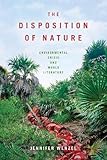The Disposition of Nature : Environmental Crisis and World Literature / Jennifer Wenzel.
Material type: TextPublisher: New York, NY : Fordham University Press, [2019]Copyright date: ©2019Description: 1 online resource (352 p.) : 8Content type:
TextPublisher: New York, NY : Fordham University Press, [2019]Copyright date: ©2019Description: 1 online resource (352 p.) : 8Content type: - 9780823286805
- online - DeGruyter
| Item type | Current library | Call number | URL | Status | Notes | Barcode | |
|---|---|---|---|---|---|---|---|
 eBook
eBook
|
Biblioteca "Angelicum" Pont. Univ. S.Tommaso d'Aquino Nuvola online | online - DeGruyter (Browse shelf(Opens below)) | Online access | Not for loan (Accesso limitato) | Accesso per gli utenti autorizzati / Access for authorized users | (dgr)9780823286805 |
Browsing Biblioteca "Angelicum" Pont. Univ. S.Tommaso d'Aquino shelves, Shelving location: Nuvola online Close shelf browser (Hides shelf browser)

|

|

|

|

|

|

|
||
| online - DeGruyter Old Schools : Modernism, Education, and the Critique of Progress / | online - DeGruyter Radical Botany : Plants and Speculative Fiction / | online - DeGruyter Technologies of Critique / | online - DeGruyter The Disposition of Nature : Environmental Crisis and World Literature / | online - DeGruyter Anarchaeologies : Reading as Misreading / | online - DeGruyter Grave Attending : A Political Theology for the Unredeemed / | online - DeGruyter Thinking Through Crisis : Depression-Era Black Literature, Theory, and Politics / |
Frontmatter -- Contents -- Introduction. Reading for the planet -- Part I. Citizens and consumers -- Chapter 1. Consumption for the common good? commodity biography in an era of postconsumerism -- Chapter 2. Hijacking the imagination: how to tell the story of the Niger delta -- Part II. Resource logics and risk logics -- Chapter 3. From waste lands to wasted lives: enclosure as aesthetic regime and property regime -- Chapter 4. How far is bhopal? inconvenient forums and corporate comparison -- Epilogue. Fixing the world -- Acknowledgments -- Notes -- Bibliography -- Index
restricted access online access with authorization star
http://purl.org/coar/access_right/c_16ec
How do literature and other cultural forms shape how we imagine the planet, for better or worse? In this rich, original, and long awaited book, Jennifer Wenzel tackles the formal innovations, rhetorical appeals, and sociological imbrications of world literature that might help us confront unevenly distributed environmental crises, including global warming.The Disposition of Nature argues that assumptions about what nature is are at stake in conflicts over how it is inhabited or used. Both environmental discourse and world literature scholarship tend to confuse parts and wholes. Working with writing and film from Africa, South Asia, and beyond, Wenzel takes a contrapuntal approach to sites and subjects dispersed across space and time. Reading for the planet, Wenzel shows, means reading from near to there: across experiential divides, between specific sites, at more than one scale.Impressive in its disciplinary breadth, Wenzel's book fuses insights from political ecology, geography, anthropology, history, and law, while drawing on active debates between postcolonial theory and world literature, as well as scholarship on the Anthropocene and the material turn. In doing so, the book shows the importance of the literary to environmental thought and practice, elaborating how a supple understanding of cultural imagination and narrative logics can foster more robust accounts of global inequality and energize movements for justice and livable futures.
Mode of access: Internet via World Wide Web.
In English.
Description based on online resource; title from PDF title page (publisher's Web site, viewed 02. Mrz 2022)


